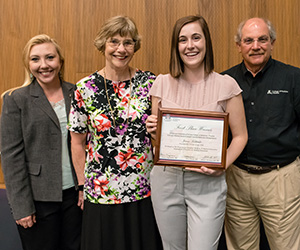Essay on Vulnerabilities Wins Writing Award
Jenna Koblinski’s essay on her journey through the first year of medical school received the Student Growth and Self-Reflection Writing Award in the annual Narrative Medicine Program competition open to all first-year medical students.
The essay discussed the challenges of medical school and first encounters with patients.
 “I do not think of myself as a writer, and it was a little intimidating putting this out there,” Koblinski said. “I feel very fortunate to have been chosen by the committee, and I have been overwhelmed with kind words about my reflection from fellow classmates, faculty and staff. We have such a supportive community.”
“I do not think of myself as a writer, and it was a little intimidating putting this out there,” Koblinski said. “I feel very fortunate to have been chosen by the committee, and I have been overwhelmed with kind words about my reflection from fellow classmates, faculty and staff. We have such a supportive community.”
Now a second-year medical student at the University of Arizona College of Medicine – Phoenix, Koblinski shared her story of overcoming anxiety and other life events in pursuing her dream of medicine.
The writing competition is meant for students to share their medical school experience. Jennifer Hartmark-Hill, MD, director of Capstones and Community Faculty Development, leads the program with David Beyda, MD, chair and professor of the Department of Bioethics and Medical Humanism, and Elaine Niggemann, MD, director of the Hematology/Cardiovascular Block.
“As cliché as it sounds, first-year really was a rollercoaster, and there were still feelings about the highs and the lows that I needed to sort through,” Koblinski said. “When I read about the writing competition, I realized that this would be the perfect opportunity to sit down and really reflect on everything I had been through for the year.”
Koblinski decided to enter the competition and share it with the community because she believes someone else might be able to relate to her experiences.
“Success in medical school doesn't equate to never having doubts or struggles. In terms of the positives I write about in the piece, I just wanted to make sure those are memories I never forget as they were so impactful to me,” Koblinski said. “Medicine is truly an amazing thing, and getting to work with people at their most vulnerable is a blessing.”
Koblinski attended the University of Arizona for her undergraduate degree in physiology and minor in psychology. She graduated from Campo Verde High School in Gilbert, Arizona.
She chose to attend the College of Medicine – Phoenix because of the community and overall feel of the campus.
“At second look, you could see how happy the first-years were, and everyone was so open to questions and wanting to make us feel welcome,” she said. “I knew at the College of Medicine – Phoenix I would receive the knowledge and training necessary to make me a successful and strong physician, but I really wanted to be somewhere where I would enjoy my time there and not just focus on the light at the end of the tunnel. After one year of medical school, I can tell you I made the right choice and am so lucky to be here.”
- Read Jenna's essay (PDF).
About the College
Founded in 2007, the University of Arizona College of Medicine – Phoenix inspires and trains exemplary physicians, scientists and leaders to advance its core missions in education, research, clinical care and service to communities across Arizona. The college’s strength lies in our collaborations and partnerships with clinical affiliates, community organizations and industry sponsors. With our primary affiliate, Banner Health, we are recognized as the premier academic medical center in Phoenix. As an anchor institution of the Phoenix Bioscience Core, the college is home to signature research programs in neurosciences, cardiopulmonary diseases, immunology, informatics and metabolism. These focus areas uniquely position us to drive biomedical research and bolster economic development in the region.
As an urban institution with strong roots in rural and tribal health, the college has graduated more than 1,000 physicians and matriculates 130 students each year. Greater than 60% of matriculating students are from Arizona and many continue training at our GME sponsored residency programs, ultimately pursuing local academic and community-based opportunities. While our traditional four-year program continues to thrive, we will launch our recently approved accelerated three-year medical student curriculum with exclusive focus on primary care. This program is designed to further enhance workforce retention needs across Arizona.
The college has embarked on our strategic plan for 2025 to 2030. Learn more.